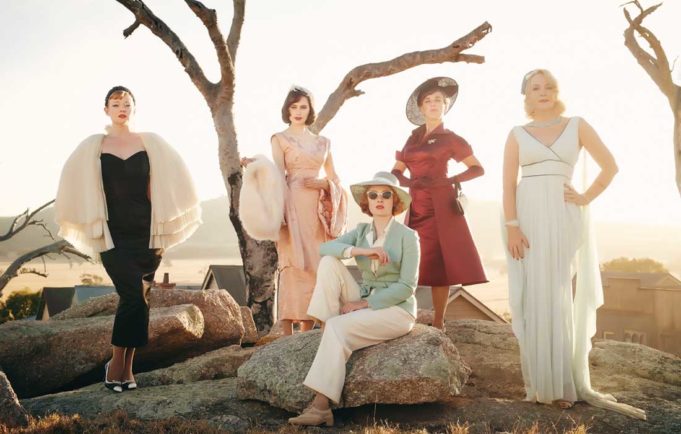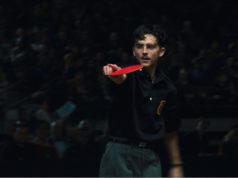I suspect that if I were Australian, I’d think The Dressmaker was the best thing I’d seen. After all, it is a nice showcase for a bunch of the country’s actors, and it tackles the great Australian theme of hating your repressive, narrow-minded hometown and getting the hell out. (Of course, the British and the Americans are no stranger to this subject, either, but the Aussies seem to do it exceptionally well.) Well, I’m not from Down Under, and I detected some fairly serious issues in the film. Still, this outback revenge fantasy wrapped in haute couture costumes is a good deal of fun.
Kate Winslet stars as Myrtle “Tilly” Dunnage, a woman who returns to her village in northern Australia in 1951 some 20 years after being run out of town. She spent that time studying and working as a clothing designer in the great fashion capitals of Europe. This doesn’t count for much back home, where Tilly’s illegitimate birth gives everyone else a license to treat her like crap. This is true even of Tilly’s mother (Judy Davis), though she at least has the excuse of suffering from dementia and not recognizing her daughter. The few townspeople who show Tilly any sympathy include Teddy (Liam Hemsworth), the town’s football hero, and the policeman (Hugo Weaving) who secretly makes dresses for himself and moans in near-sexual ecstasy when he sees the fabrics that Tilly is having shipped to her.
[box_info]The Dressmaker
Starring Kate Winslet and Liam Hemsworth. Directed by Jocelyn Moorhouse. Written by Jocelyn Moorhouse and P.J. Hogan, based on Rosalie Ham’s novel. Rated R. Now playing in Dallas.[/box_info]
This is adapted from Rosalie Ham’s novel, and screenwriters Jocelyn Moorhouse and P.J. Hogan wisely eliminate the author’s exhaustive writing about fabric and her palpable disgust for the sexual act. What’s left are plentiful amounts of comedy and tragedy, and unfortunately Moorhouse — who hasn’t directed a film since her abortive Hollywood stint in the 1990s — doesn’t have the touch to balance them out. When characters start dying and a flashback reveals Tilly’s traumatic past, it jars with the wacky humor that came before. Ham’s satire of this intolerant, provincial backwater town verges on the cartoonish, and while Moorhouse and her actors know how to play cartoon, the villagers are so relentlessly awful that the movie, much like the book, comes off as every bit as judgmental as them.
A buffet of tasty performances helps make this digestible. Winslet doesn’t have a fashion model’s body, yet that’s precisely what suits her to the role of a woman who has worked to make herself what she is rather than being born to it. (A taller, more glamorous actress like Nicole Kidman would have fit the role too comfortably.) Few actresses could stand up to Winslet, yet Davis grows in stature as her character becomes more lucid and starts to exert authority over her strong-willed daughter. Sensuous-lipped Sarah Snook injects some weight of her own as an ugly duckling whom Tilly transforms into a swan, and who promptly turns on her designer. Weaving camps it up much like he did in the drag classic The Adventures of Priscilla, Queen of the Desert, but he also brings some tragic dignity and grace to his character as he atones for his part in Tilly’s original disgrace. Even Hemsworth, who never impressed me much, seems way more comfortable on his native soil than he ever did in his American roles and flashes an easy charm as a romantic lead. Alison Whyte portrays the mayor’s anxiety-ridden wife, who gets a truly gratifying subplot in which she finally takes revenge on the husband (Shane Bourne) who has drugged and raped her for years.
Then, of course, there are the clothes. As Tilly becomes the town seamstress, the movie finds its comic high point midway through when the village women check their mail and shop for groceries in Tilly’s dramatic, sculpted, room-stopping gowns and frocks. These Balenciaga-inspired costumes by Margot Wilson and Marion Boyce function as plentiful eye candy to make this tale of retribution go down easily.












